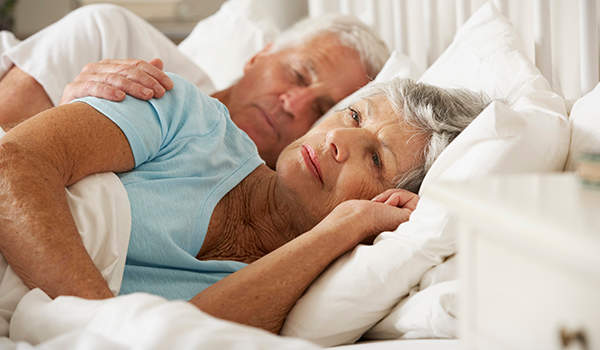失眠is prevalent among those living with cancer. But even when the cancer is gone, sleep issues often remain.
而乳腺癌patients appear to be the most likely to report insomnia compared to those with other forms of cancer, it doesn't really matter the type of cancer you beat or how old you are; sleep disorders tend to be associated with all types of cancer and affect all types of cancer survivors.
发表了探索性研究Pediatric Blood & Cancer(2015)发现,在82岁至18岁之间的62名癌症幸存者中,19%的患者有睡眠呼吸障碍。事实上,患儿童癌症幸存者被发现超过睡眠呼吸呼吸风险的三倍以上。
在妇科肿瘤中发表的另一项研究发现,55%的成人妇科癌症幸存者报告睡眠障碍,并且已经发现周围42 - 69的女性乳腺癌经历失眠症的症状。
Why does cancer cause sleep problems?
The study published in Gynecologic Oncology found that those who received chemoradiation were 4.5 times more likely to experience sleep disturbances compared to other patients. So the cancer treatment itself could have a negative impact on sleep.
当然,癌症(及其治疗)可能是痛苦的痛苦的存在已被发现与过度的白天嗜睡和短暂的睡眠持续困扰有关。然而,痛苦的来源或位置似乎很重要。研究发现,与慢性疼痛相比,急性疼痛对睡眠的影响更多。急性疼痛包括急性肌肉,骨骼和关节疼痛。慢性疼痛是指慢性疾病,如骨关节炎,RA和纤维肌痛。
Younger patients have been found to experience more symptoms of insomnia than those higher in age, perhaps due to higher levels of anticipatory anxiety associated with the diagnosis.
Previous studies have suggested a link between obesity and sleep disturbances. However, after adjusting for age, race, presence of pain, education level, and menopausal status, this association has been found to be不再有统计学意义.
How cancer survivors can improve their sleep
Melatonin supplements可能有助于,特别是乳腺癌幸存者。A clinical trialfound that postmenopausal breast cancer survivors who took 3mg of melatonin at 9 PM every night for four months reported improvements in their sleep quality. In fact, nearly one in five of those who took melatonin who were poor sleepers at the start of the study were no longer poor sleepers four months later.
You don't necessarily need to pop pills, though.
A 2013 study published in theJournal of Cancer Survivorshipfound that mind-body bridging (designed to improve awareness and coping methods) and mindfulness meditation (based on mindfulness-based stress-reduction, which includesmeditation and yoga) can improve sleep in posttreatment cancer survivors.
Both mind-body bridging and mindfulness meditation were found to reduce sleep disturbance symptoms better than睡眠卫生独自教育。虽然睡眠卫生教育在研究期间有效,但是当会议结束时,与思想身体桥接和思想冥想相比,单独睡眠卫生培训的有效性被证明是劣等。
Survivors of nasopharyngeal cancer often experience issues with their heads, necks, and shoulders, all of which can impact sleep.一项研究发现这六个月program of Tai Chi Qigong training improved neck mobility, maintained jaw and shoulder joint mobility, and reduced sleep problems.
认知行为治疗can be particularly effective for cancer patients and survivors, too.
已发现癌症患者的未经处理的睡眠紊乱对免疫反应和整体存活产生负面影响。因此,重要的是,在接受癌症治疗时,或享受作为癌症幸存者的生活时,不忽视睡眠问题。
Sources:
Chen, Wendy, Anita Giobbie-Hurder, Kathryn Gantman, Jennifer Savoie, Rochelle Scheib, Leroy Parker, and Eva Schernhammer. "A randomized, placebo-controlled trial of melatonin on breast cancer survivors: impact on sleep, mood, and hot flashes." Breast Cancer Research and Treatment 145.2 (2014): 381-388. Accessed May 31, 2016.
Fong,Shirley,Shamay Ng,H. Lee,Marco Pang,W. Luk,Joanne Chung,Janet Wong和丰富的大师。“6个月的太极气功训练计划对鼻咽癌,宫颈和肩部联合流动性和鼻咽癌幸存者休眠问题的影响。”一体化癌症治疗14.1(2015):16-25。访问2016年5月31日。
凯西,卢布,乔治安娜,丽莎盖西和查尔琳Gamaldo。“儿童癌症幸存者的睡眠呼吸风险:探索性研究。”儿科血液和癌症62.4(2015):693-697。访问2016年5月31日。
Klyushnenkova, Elena, John Sorkin, and Lisa Gallicchio. "Association of obesity and sleep problems among breast cancer survivors: results from a registry-based survey study." Supportive Care in Cancer 23.12 (2015): 3437-3445. Accessed May 31, 2016.
Nakamura,Yoshio,David Lipschitz,Renee Kuhn,Anita Y. Kinney和Gary W. Donaldson。“调查两个简短的心灵干预计划,以管理癌症幸存者中的睡眠障碍:试点随机对照试验。”癌症生存杂志7.2(2013):165-182。访问2016年5月31日。
Tung, C., S. Westin, C. Sun, R. Lacour, L. Meyer, M. Schlumbrecht, and D. Bodurka. "Sleep disturbances: A critical issue among gynecologic cancer survivors." Gynecologic Oncology 130.1 (2013). Accessed May 31, 2016.


